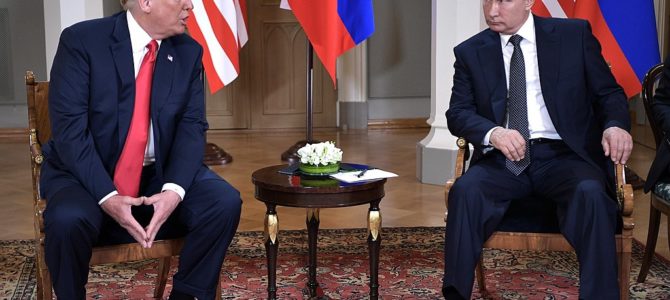
On Monday, President Donald Trump managed to make a bad situation much, much worse. In a press conference held after his summit meeting with Russian President Vladimir Putin, Trump strongly implied he agreed with Putin’s assessment that the Russians did not meddle in the 2016 U.S. elections, even though U.S. intelligence has concluded that they did. Despite Trump’s spectacular bungling of this diplomatic moment with Putin, the Trump administration is still pushing back hard against Moscow.
The optics going into the summit were already terrible. The U.S. foreign policy establishment, along with national security junkies and armchair quarterbacks, had been waiting with bated breath to see what would happen today when the two men met behind closed doors. The meeting was announced a couple of weeks ago to the surprise and feigned horror of many. For some, Trump’s decision to meet with Putin was further evidence of collusion between the two countries.
That’s no doubt partly why Trump agreed to the meeting. The U.S. president loves nothing so much as triggering his opponents on the Left, and this meeting certainly delivered on that promise. But no one was quite ready for the brazenness with which Trump appeared to side with Russia’s authoritarian leader.
At the press conference, Trump said, “[U.S.] intelligence agencies think it’s Russia. I have President Putin — he just said it’s not Russia. I don’t see any reason why it would be.” Putin, for his part, magnanimously offered to have Russian intelligence work with U.S, intelligence in investigating the alleged meddling, an offer that Trump called “incredible.”
The response to Trump’s comments has bordered on hysterical, and for good reason. Trump made both himself and the United States look utterly foolish in front of the steely eyed Putin, who no doubt is reveling in his ability to play both the president and the U.S. media. The ensuing chaos is music to his ears.
Not unlike Trump’s summit with North Korean leader Kim Jong Un, the meeting with Putin validates a regime that has violated the borders of other sovereign nations, is propping up the Assad regime’s bloody war in Syria, is constantly provoking its neighbors, and has attempted to meddle in America’s elections. Russia is an adversary of the United States, plain and simple, and Trump just submissively rolled over onto his back — in front of the entire world.
But is this proof that Trump is in Putin’s pocket? That he’s beholden to Russia? That the United States has been utterly infiltrated by a foreign country? No, although that’s what the hysterical say. House Minority Leader Nancy Pelosi tweeted Monday that she continually wonders what the Russians have on Trump, writing that it’s the “only thing that explains [Trump’s] behavior & his refusal to stand up to Putin.”
But there’s a far simpler explanation: Trump was more concerned with sticking it to his domestic opponents than being tough with Putin. He’s trolling the Left in America — but he’s recklessly doing it on the international stage. He has allowed his own ego and his fight with the mainstream media and the Left over the Russia collusion narrative to dictate how he engages the leader of an adversarial foreign country.
Trump might be a pawn of Putin, but not in the way the media like to portray it. He’s a pawn because Putin has a good read on Trump and the domestic climate in America. He knows just which buttons to press, and how to play on Trump’s weaknesses.
Although Trump’s incredible statements at the press conference were irresponsible, naïve, and even dangerous, they do not reflect current U.S. policy toward Russia. And that’s a very good thing.
Consider what has actually happened since Trump took office. Congress has repeatedly sanctioned Russia and the Justice Department has indicted Russians for their various nefarious actions, including meddling with the 2016 election. The latest indictment came on Friday when Deputy Attorney General Rod Rosenstein announced the indictment of 12 Russian intelligence officers for hacking the Democratic National Convention.
That indictment follows a separate, but related, indictment of 13 Russians and three Russian entities earlier this year. Let’s not forget that back in February, U.S. commandos killed as many as 300 Russian mercenaries in Syria, where the Trump administration has repeatedly pushed back against Russia’s military adventurism.
The same day as the Trump-Putin summit, two separate events took place. First, the Justice Department charged a Russian woman with being a foreign agent who was trying to arrange secret meetings between Trump and Putin. Second, U.S. Marines were training with their Ukrainian counterparts in military drills clearly aimed at preparing Ukraine for further conflict with Russia.
The Trump administration has also done something that the Obama administration refused to do: it authorized the sale of lethal arms to Ukraine, including anti-tank missiles, to help the country in its fight against separatists — that is to say, Russian forces — in the ongoing war in eastern Ukraine.
The Trump administration has more or less adopted the correct policy toward Russia. Moreover, Trump does not wield dictatorial authority. He can’t unilaterally prop up or protect Russia, even if he wanted to. He’s restrained in these matters, as all presidents ought to be and, so far, he’s pursued rather punitive policies toward Moscow, his behavior in front of the cameras notwithstanding.
To be sure, Trump’s statements at the summit were startlingly reckless. They hurt America’s position in the world and weakened it in front of the unflappable Putin. But amid all the chaos and concern, it’s important to remember that for pushing back against Moscow, actions speak louder than words.
An earlier version of this essay appeared in INBOUND on Monday.









